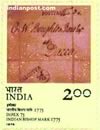| Postal Stamp Image |
: |
 |
| Stamp Issue Date |
: |
25/12/1975 |
| Postage Stamp Dinomination |
: |
2.00 |
| Postal Stamp Serial Number |
: |
0797 |
| Postal Stamp Name |
: |
INDIAN BISHOP MARK |
| Stamp Information |
: |
The India Ntional Philatelic Exhibition (INPEX-75) being organised by the Posts and Telegraphs Department from Dcember 25-31 at Calcutta is the second one of its kind, the first having been held in New Delhi in 1970. India has also staged two International Philatelic Exhibitions (INDIPEX) in 1954 and 1973. Besides, a series of Regional Exhibitions have also been held in various postal Circles.
There is no doubt that the Philaatelic Exhibitions, held periodically, have gone a long way in creating a new aarness about this ducative and fascinating hobby. It has, indeed, enthused more and more people, particularly from the younger generations to take to this hobby.
The Exhibition which will have a capacity of 1,000 frames will display some of the rare and outstanding collections in the country. These will include Indian Classics, proofs and essay stamps, Indian stamps used abroad, Indian States, Air Mails, Indian Collections, Postal stationary and Literature. A good collection of stamps of other countries will also be shown by some collectors and philatelists. The Thematic Section of the Exhbition will have various eye-catching themes like animals, flowers, trees, aviation and space flights.
INPEX-75 Stamps
The P & T Department is happy to bring out two stamps on the occasion of the Second India National Philatelic Exhibition- INPEX-75- on the 25th December, 1975. These stamps will depict-
The Indian Bishop Mark in the denomination of Rs. 2/-.
All early Mail Cart in the denomination of 25 Paise.
On this occasion of INPEX-75 more attention has ben given for the reproduction of the early postmarks used in India both onnstamps, first day cancelation and special cancellations.
The earliest use of handstuck postmarks anywhere in the world had been in 1661 inGreat Britain when Col. Henry Bishop was the Postmaster General there. This postmark has ben named as "Bishop Mark" after his name. This is very simple in design consisting of circle divided horizontally in half. The upper half bears a number to indicate the date of the month and the lower half the name of the month in an abbreviated form. The earliest recorded examples of the Bishop Mark are those of April, 1661 used in London GPO. Later on, however, they were used in places like Dublin, Quebec, Calcutta, etc. Examples of such "Bishop Marks" are extremely rare.
The letter with the Bishop Mark used on the stamp of Rs 2/- was sent from CAlcuta to Dacca in 1775, stamped "CALCUTTA" and "POSTPAD" i addition to the Bishop Mark "@ FEB.". This letter is unique as it bears the earliest of the oly four "Indian Bishop Marks" known.
The picture of an early Mail Cart has bee adopted as the motif of the stamp in 25 P. The mail cart of early days was drawn by one or more horses. The dashed past at a tremendous pace uphill and downhill! and through the plains carrying mail.
Material for the stamp on The Indian Bishop mark by courtesy of Mr. Hanimond Giles. |
| Stamp Currency |
: |
R |
| Stamp Type |
: |
COMMEMORATIVE |
| Stamp Language |
: |
English |
| Stamp Overall Size |
: |
3.91 X 2.90 cms |
| Postal Stamp Print Size |
: |
3.56 x 2.5 cms. |
| Number of Stamps Per Sheet |
: |
35 |
| Stamp Perforations |
: |
13 x 13 |
| Postal Stamp Shape |
: |
Diagonal |
| Postage Stamp Paper |
: |
Unwatermarked adhesive stamp paper |
| Indian Stamp Process |
: |
Photogravure |
| Number of stamps printed |
: |
20,00,000 |
| Stamp Printed At |
: |
India Security Press |
| Indian Stamp's Color |
: |
Brown |
|
|
